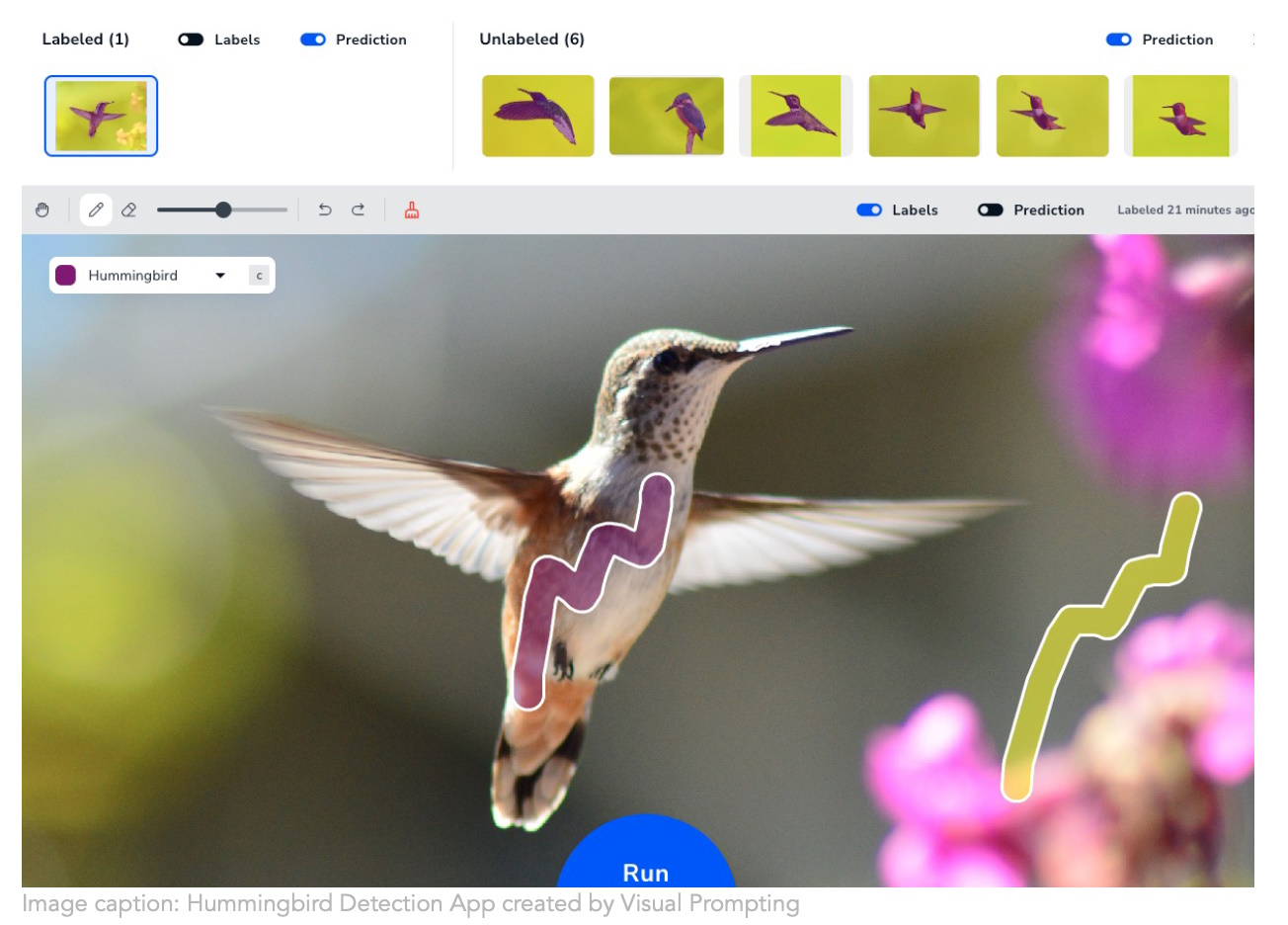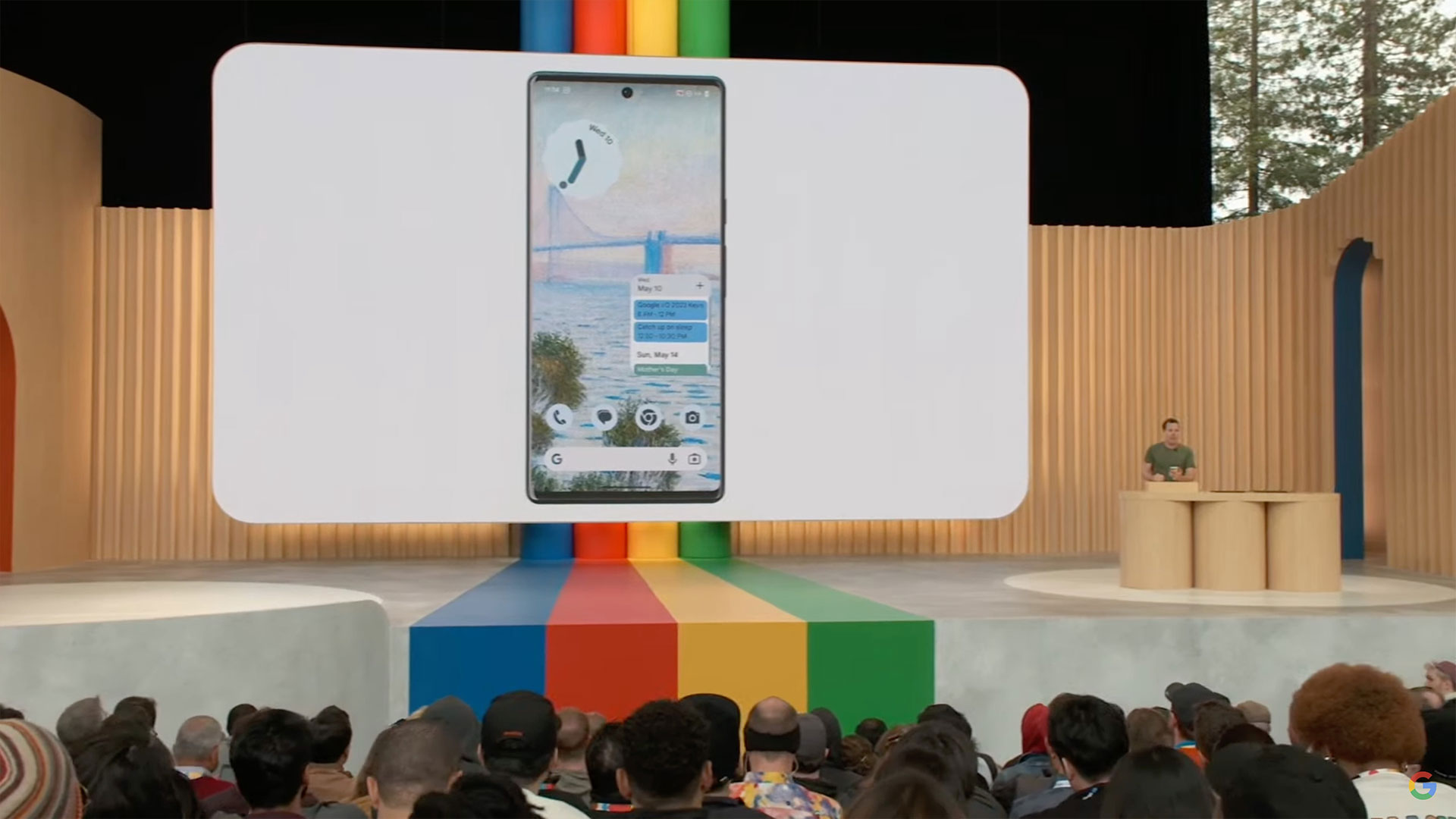Category: TECHNOLOGY
Google bets the farm on AI, Twitter gets a new CEO, and Meta contractors protest
Hey, friends — you’ve made it to the end of the week. Congrats! That’s an achievement worth celebrating, I’d say. And what better way to ring in the weekend than by recapping the week in tech? This is Week in Review (WiR), TechCrunch’s weekly news roundup, where we highlight the most important, impactful and otherwise eye-popping stories over the past days. We get it — you’re busy. Hence, a digest that highlights all the key happenings.
Before we get on to the good stuff, a reminder that on May 17, TechCrunch Live, TC’s virtual speaker series, will feature Intel Capital’s Mark Rostick and Garima Kapoor — the founder of MinIO, a startup building an enterprise-grade, but open source, object storage solution. On the further horizon, there’s TC City Spotlight: Atlanta on June 7, which will host a pitch competition, a panel discussion on investing in the Atlanta ecosystem and more. Last but not least is Disrupt in San Francisco (from September 19–21), a conference jam-packed with expert-led sessions and interviews with movers and shakers in the tech space. Mark the dates!
Now, with that out of the way, here’s the top headlines.
most read
Google I/O, recapped: On Google I/O keynote day, the search and internet advertising giant put forth a rapid-fire stream of announcements during its developer conference — including many unveilings of recent AI-related things it’s been working on. If you didn’t have time to watch a two-hour presentation, the TechCrunch team took that on and delivered story after story on new products and features — plus quick hits of the biggest news in an easy-to-digest, easy-to-skim list.
The purge continues: Twitter is purging inactive accounts on its platform, which may free up a number of long-coveted usernames, according to recent tweets by owner Elon Musk. Though Twitter for years has promised to put more usernames back into rotation, it hadn’t yet made any large-scale effort to do so, despite having an inactive account policy in place that suggests Twitter’s users should log in at least every 30 days to keep accounts from being permanently removed.
New Twitter CEO: In other Twitter news, Elon Musk says that he’s found a new CEO for Twitter. Musk didn’t initially specify who’s going to take on the role, though The Wall Street Journal is now reporting that NBCUniversal head of advertising Linda Yaccarino is actively “in talks” for the position. In a tweet, Musk announced that he’ll transition from his role as CEO of the company to serving as its executive chair and chief technology officer. The new CEO is expected to start in six weeks, according to Musk.
Health records leaked: NextGen Healthcare, a U.S.-based provider of electronic health record software, admitted that hackers breached its systems and stole the personal data of more than 1 million patients. In a data breach notification filed with the Maine attorney general’s office, NextGen Healthcare confirmed that hackers accessed the personal data of 1.05 million patients, including approximately 4,000 Maine residents.
Rapid lays off workers: Rapid, previously known as RapidAPI, a startup that built out an API marketplace valued at $1 billion last year, has laid off another 70 employees less than two weeks after letting go of 50% of its staff, TechCrunch has learned. An affected employee who wished to remain anonymous told TC that just 42 people remain at the company — down from 230 in April — reflecting an 82% drop in headcount.
Meta contractors protest: Content moderators under Sama, Meta’s content review subcontractor in Africa, earlier this week picketed at the company’s headquarters in Kenya demanding their April salary. The 184 moderators have sued Sama for allegedly laying them off unlawfully, after Meta wound down its content review arm in March, and Majorel, the social media giant’s new partner based in Africa, for blacklisting on instruction by Meta.
From Pokémon to Peridot: From the makers of Pokémon Go comes another mobile game that brings cute little creatures to our fingertips: Peridot. Like a ’90s Tamagotchi toy, Peridot is a pet simulator, but it takes place completely within augmented reality. You can feed, play with, walk, breed and socialize with your Peridots, but don’t worry — if you take a break from the game, your creatures won’t poop all over your screen and/or die.
Texting, but different: “The medium is the message” is the common phrase, but entrepreneur Alexis Traina believes that messages themselves — text messages, to be exact — deserve attention, too. Traina is the CEO and co-founder of HiNOTE, an app that helps people create messages, set over personalized backdrops of anything from a tipped-over wineglass to a branded letterhead notebook page. The idea, she said in an interview with TechCrunch, is that she wouldn’t get up every day and dress in green, blue and gray — so why do our text messages stick to those colors?
audio
Need listening material for your weekday commute — or shower, for that matter? TechCrunch has you covered. On Equity, the crew dove into a brace of new Mayfield funds, as well as how Wellthy is helping caregivers feel less overwhelmed and the slowing growth of tech companies. Over at Found, the team talked with the co-founders of Juliet, who are reimagining boxed wine. The Chain Reaction team released a bonus episode from a fireside chat with Nadya Tolokonnikova, the creator of the protest art collective Pussy Riot, at NFT NYC in April 2023. The TechCrunch Podcast covered Google I/O, including the tech, attend talks and demos. To round things out, TechCrunch Live talked about developing therapeutics for anti-aging with James Peyer, the co-founder of Cambrian BioPharma, and Maryanna Saenko, co-founder and partner at Future Ventures.
TechCrunch+
TC+ subscribers get access to in-depth commentary, analysis and surveys — which you know if you’re already a subscriber. If you’re not, consider signing up. Here are a few highlights from this week:
Visions of a colorful future: How far has the psychedelics medicine industry come over the past 12 months? Well, it depends on where you look. A recent survey indicates that instead of simply looking for attractive opportunities, investors and founders are increasingly putting their minds to building the foundations for an industry that can employ the power of psychedelics to change lives.
AI’s eating search: News from Google’s AI-soaked developer event this week makes it plain that we’re on the cusp of a new era of search. Following Microsoft’s molding of OpenAI’s tech into Bing, Google is experimenting with its own AI tech and opening up new ways to use search. It’s clear we’re about to see the first major overhauls in the market for finding information on the internet in a really long time.
Salesforce embraces generative AI: Salesforce is increasingly investing in generative AI as it becomes apparent that the technology has the potential to transform how we interact with software — allowing us to describe what we want instead of clicking or tapping.
Get your TechCrunch fix IRL. Join us at Disrupt 2023 in San Francisco this September to immerse yourself in all things startup. From headline interviews to intimate roundtables to a jam-packed startup expo floor, there’s something for everyone at Disrupt. Save up to $800 when you buy your pass now through May 15, and save 15% on top of that with promo code WIR. Learn more.
Disrupt 2023
Google bets the farm on AI, Twitter gets a new CEO, and Meta contractors protest by Kyle Wiggers originally published on TechCrunch
The week in AI: Google goes all out at I/O as regulations creep up
Keeping up with an industry as fast-moving as AI is a tall order. So until an AI can do it for you, here’s a handy roundup of the last week’s stories in the world of machine learning, along with notable research and experiments we didn’t cover on their own.
This week, Google dominated the AI news cycle with a range of new products that launched at its annual I/O developer conference. They run the gamut from a code-generating AI meant to compete with GitHub’s Copilot to an AI music generator that turns text prompts into short songs.
A fair number of these tools look to be legitimate labor savers — more than marketing fluff, that’s to say. I’m particularly intrigued by Project Tailwind, a note-taking app that leverages AI to organize, summarize and analyze files from a personal Google Docs folder. But they also expose the limitations and shortcomings of even the best AI technologies today.
Take PaLM 2, for example, Google’s newest large language model (LLM). PaLM 2 will power Google’s updated Bard chat tool, the company’s competitor to OpenAI’s ChatGPT, and function as the foundation model for most of Google’s new AI features. But while PaLM 2 can write code, emails and more, like comparable LLMs, it also responds to questions in toxic and biased ways.
Google’s music generator, too, is fairly limited in what it can accomplish. As I wrote in my hands on, most of the songs I’ve created with MusicLM sound passable at best — and at worst like a four-year-old let loose on a DAW.
There’s been much written about how AI will replace jobs — potentially the equivalent of 300 million full-time jobs, according to a report by Goldman Sachs. In a survey by Harris, 40% of workers familiar with OpenAI’s AI-powered chatbot tool, ChatGPT, are concerned that it’ll replace their jobs entirely.
Google’s AI isn’t the end-all be-all. Indeed, the company’s arguably behind in the AI race. But it’s an undeniable fact that Google employs some of the top AI researchers in the world. And if this is the best they can manage, it’s a testament to the fact that AI is far from a solved problem.
Here are the other AI headlines of note from the past few days:
- Meta brings generative AI to ads: Meta this week announced an AI sandbox, of sorts, for advertisers to help them create alternative copies, background generation through text prompts and image cropping for Facebook or Instagram ads. The company said that the features are available to select advertisers at the moment and will expand access to more advertisers in July.
- Added context: Anthropic has expanded the context window for Claude — its flagship text-generating AI model, still in preview — from 9,000 tokens to 100,000 tokens. Context window refers to the text the model considers before generating additional text, while tokens represent raw text (e.g., the word “fantastic” would be split into the tokens “fan,” “tas” and “tic”). Historically and even today, poor memory has been an impediment to the usefulness of text-generating AI. But larger context windows could change that.
- Anthropic touts ‘constitutional AI’: Larger context windows aren’t the Anthropic models’ only differentiator. The company this week detailed “constitutional AI,” its in-house AI training technique that aims to imbue AI systems with “values” defined by a “constitution.” In contrast to other approaches, Anthropic argues that constitutional AI makes the behavior of systems both easier to understand and simpler to adjust as needed.
- An LLM built for research: The nonprofit Allen Institute for AI Research (AI2) announced that it plans to train a research-focused LLM called Open Language Model, adding to the large and growing open source library. AI2 sees Open Language Model, or OLMo for short, as a platform and not just a model — one that’ll allow the research community to take each component AI2 creates and either use it themselves or seek to improve it.
- New fund for AI: In other AI2 news, AI2 Incubator, the nonprofit’s AI startup fund, is revving up again at three times its previous size — $30 million versus $10 million. Twenty-one companies have passed through the incubator since 2017, attracting some $160 million in further investment and at least one major acquisition: XNOR, an AI acceleration and efficiency outfit that was subsequently snapped up by Apple for around $200 million.
- EU intros rules for generative AI: In a series of votes in the European Parliament, MEPs this week backed a raft of amendments to the bloc’s draft AI legislation — including settling on requirements for the so-called foundational models that underpin generative AI technologies like OpenAI’s ChatGPT. The amendments put the onus on providers of foundational models to apply safety checks, data governance measures and risk mitigations prior to putting their models on the market
- A universal translator: Google is testing a powerful new translation service that redubs video in a new language while also synchronizing the speaker’s lips with words they never spoke. It could be very useful for a lot of reasons, but the company was upfront about the possibility of abuse and the steps taken to prevent it.
- Automated explanations: It’s often said that LLMs along the lines of OpenAI’s ChatGPT are a black box, and certainly, there’s some truth to that. In an effort to peel back their layers, OpenAI is developing a tool to automatically identify which parts of an LLM are responsible for which of its behaviors. The engineers behind it stress that it’s in the early stages, but the code to run it is available in open source on GitHub as of this week.
- IBM launches new AI services: At its annual Think conference, IBM announced IBM Watsonx, a new platform that delivers tools to build AI models and provide access to pretrained models for generating computer code, text and more. The company says the launch was motivated by the challenges many businesses still experience in deploying AI within the workplace.
Other machine learnings
Image Credits: Landing AI
Andrew Ng’s new company Landing AI is taking a more intuitive approach to creating computer vision training. Making a model understand what you want to identify in images is pretty painstaking, but their “visual prompting” technique lets you just make a few brush strokes and it figures out your intent from there. Anyone who has to build segmentation models is saying “my god, finally!” Probably a lot of grad students who currently spend hours masking organelles and household objects.
Microsoft has applied diffusion models in a unique and interesting way, essentially using them to generate an action vector instead of an image, having trained it on lots of observed human actions. It’s still very early and diffusion isn’t the obvious solution for this, but as they’re stable and versatile, it’s interesting to see how they can be applied beyond purely visual tasks. Their paper is being presented at ICLR later this year.

Image Credits: Meta
Meta is also pushing the edges of AI with ImageBind, which it claims is the first model that can process and integrate data from six different modalities: images and video, audio, 3D depth data, thermal info, and motion or positional data. This means that in its little machine learning embedding space, an image might be associated with a sound, a 3D shape, and various text descriptions, any one of which could be asked about or used to make a decision. It’s a step towards “general” AI in that it absorbs and associates data more like the brain — but it’s still basic and experimental, so don’t get too excited just yet.
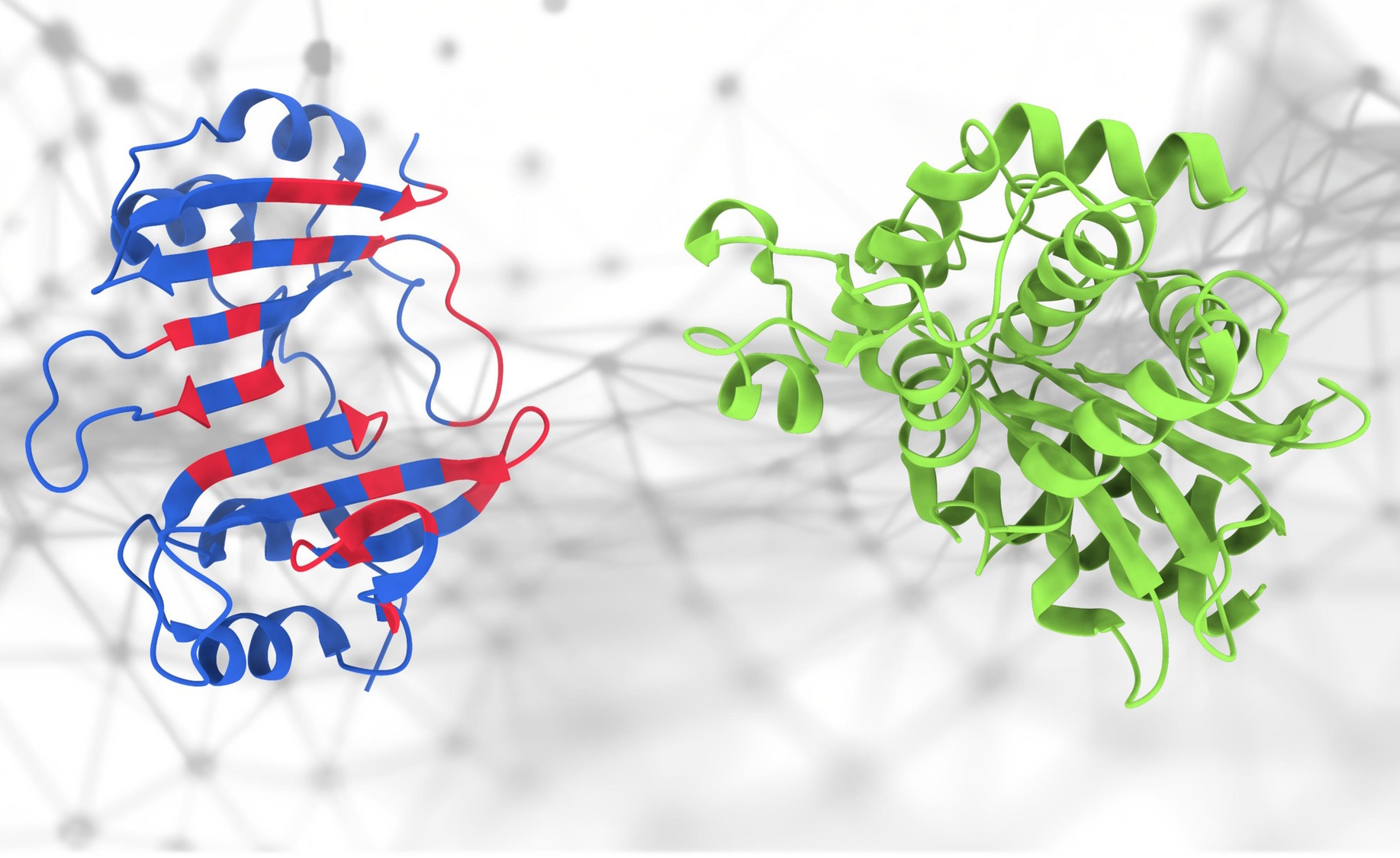
If these proteins touch… what happens?
Everyone got excited about AlphaFold, and for good reason, but really structure is just one small part of the very complex science of proteomics. It’s how those proteins interact that is both important and difficult to predict — but this new PeSTo model from EPFL attempts to do just that. “It focuses on significant atoms and interactions within the protein structure,” said lead developer Lucien Krapp. “It means that this method effectively captures the complex interactions within protein structures to enable an accurate prediction of protein binding interfaces.” Even if it isn’t exact or 100% reliable, not having to start from scratch is super useful for researchers.
The feds are going big on AI. The President even dropped in on a meeting with a bunch of top AI CEOs to say how important getting this right is. Maybe a bunch of corporations aren’t necessarily the right ones to ask, but they’ll at least have some ideas worth considering. But they already have lobbyists, right?
I’m more excited about the new AI research centers popping up with federal funding. Basic research is hugely needed to counterbalance the product-focused work being done by the likes of OpenAI and Google — so when you have AI centers with mandates to investigate things like social science (at CMU), or climate change and agriculture (at U of Minnesota), it feels like green fields (both figuratively and literally). Though I also want to give a little shout out to this Meta research on forestry measurement.

Doing AI together on a big screen — it’s science!
Lots of interesting conversations out there about AI. I thought this interview with UCLA (my alma mater, go Bruins) academics Jacob Foster and Danny Snelson was an interesting one. Here’s a great thought on LLMs to pretend you came up with this weekend when people are talking about AI:
These systems reveal just how formally consistent most writing is. The more generic the formats that these predictive models simulate, the more successful they are. These developments push us to recognize the normative functions of our forms and potentially transform them. After the introduction of photography, which is very good at capturing a representational space, the painterly milieu developed Impressionism, a style that rejected accurate representation altogether to linger with the materiality of paint itself.
Definitely using that!
The week in AI: Google goes all out at I/O as regulations creep up by Kyle Wiggers originally published on TechCrunch
https://techcrunch.com/2023/05/13/the-week-in-ai-google-goes-all-out-at-i-o-as-regulations-creep-up/
A pivot, in this market‽
Minting new accelerators
The team behind Better Tomorrow Ventures saw some of its biggest wins before the firm even existed — back when the founding duo was backing pre-seed companies at 500. Now, founding partners Sheel Mohnot and Jake Gibson are launching an accelerator of their own.
Here’s what to know: The Mint will be a three-month accelerator, based out of San Francisco, that cuts $500,000 checks in exchange for 10% equity in between six to 10 startups. The initial cohort, which starts this upcoming August, already accepted one company, and sent a second acceptance letter out today.
Better Tomorrow seems to be stepping in where it believes Y Combinator is lacking. “YC is built for scale. The advice is a lot like one-size-fits-all,” Mohnot said. “We felt like with fintech, there are so many things that are unique about building that it makes sense to have something distinct.”
Welcome to Startups Weekly, a nuanced take on this week’s startup news and trends by Senior reporter Natasha Mascarenhas.
Startups Weekly readers know I love a pivot story, and now I have one of my own: I’m leaving TechCrunch! This is my last Startups Weekly issue, a newsletter that I’ve written every week for over two years. I’ll be moving on to a new publication, continuing to report on venture capital and startups.
It’s a bittersweet move. I’ve spent most of my post-graduation career at TechCrunch. The publication helped me land many professional firsts: my first scoop, my first long-form feature story, my first valuation-run bull cycle and my first layoffs-ridden bear cycle. I also launched an entire new show for Equity, TC’s flagship podcast, interviewing guests about their hottest takes and career paths. Plus, I interviewed Kevin Hart on the Disrupt stage. Grateful is an understatement.
While this will be my last Startups Weekly, it’s not the end of this newsletter. I’m thrilled to share that Haje Jan Kamps, a longtime reporter and the creator of our amazing Pitch Deck Teardown series, will be taking over Startups Weekly. Haje is one of the reporters I quote most in this newsletter because all of his work fits the “startup must read” category — and his witty headlines don’t hurt, either.
As for who will be covering my beat, TC already has an amazing venture desk, including but not limited to Connie Loizos, Mary Ann Azevedo, Christine Hall, Dominic-Madori Davis and Rebecca Szkutak. Big shout out to Kyle Wiggers, as well, who is fearlessly, and thoughtfully, covering artificial intelligence alongside Devin Coldewey.
In my next role, I’ll be covering the same beat and the same city, focusing on deeply researched feature pieces and scoops. To learn more about where I’m going next, and to follow my work, check out my (free!!!) Substack and stay in touch on Twitter. I’m excited for the new challenge. Tech has never been more newsworthy. Sources, I still would love your tips: My Signal: is 1 925 271 0912.
Now let’s get into a newsletter!
The AI debate
On TC+, I wrote a story about the debate happening inside every venture firm right now: What’s the best way to capture the artificial intelligence zeitgeist?
Here’s an excerpt:
Precursor’s Charles Hudson wants to be cautious but not too cautious. The venture capitalist was one of many at an AI confab last month, but he — and many others — has not yet made a new AI investment during the current hype cycle.
Also like many investors, he’s seen an inflection point take over a sector before, bringing in boatloads of capital, new founders and, at times, speedy and FOMO-driven deals. Historically, Hudson hasn’t minded sitting out. “With crypto, for example, I was OK being at almost zero,” he said. “I don’t think I’m OK with zero as the answer for AI. The question is where and how.”
- OpenAI’s new tool attempts to explain language models’ behaviors
- Mayfield raised just shy of $1B to avoid unicorn hype
- Anthropic thinks ‘constitutional AI’ is the best way to train models
Image Credits: Daniel Grizelj (opens in a new window) / Getty Images
Minting new accelerators
The team behind Better Tomorrow Ventures saw some of its biggest wins before the firm even existed — back when the founding duo was backing pre-seed companies at 500. Now, founding partners Sheel Mohnot and Jake Gibson are launching an accelerator of their own.
Here’s what to know: The Mint will be a three-month accelerator, based out of San Francisco, that cuts $500,000 checks in exchange for 10% equity in between six to 10 startups. The initial cohort, which starts this upcoming August, already accepted one company, and sent a second acceptance letter out today.
Better Tomorrow seems to be stepping in where it believes Y Combinator is lacking. “YC is built for scale. The advice is a lot like one-size-fits-all,” Mohnot said. “We felt like with fintech, there are so many things that are unique about building that it makes sense to have something distinct.”
- AI2 Incubator’s new $30M fund triples down on early stage AI startups
- Higher interest rates are fostering a fintech comeback story
- We’re close to peak pessimism around fintech
Venture-backed everything for real-world problems, please
On Equity this week, the trio chatted through some deals of the week and themes — but the bright spot of the show was most certainly Mary Ann’s coverage of Wellthy. The startup recently raised $25 million to help caregivers feel less overwhelmed through a product it describes as “tech-enabled care concierge.”
Here’s what to know: While the venture ecosystem has certainly rushed to back digital health startups, and mental wellness is growing as a conversation, there is never enough on caretaking specifically.
- Inside the story of one founder’s choice to shut her startup down, and advice for others going forward
- Yeah, tech growth is slowing down
- Despite a rocky start, climate tech is in a good position to tackle the rest of 2023
- And that’s a wrap on my last Equity episode! To Equity listeners, thanks for coming along my entire journey on the show, from jumping on Equity Friday’s to hosting and leading the creation of our Equity Wednesday episodes. I’m so proud of my past three years on the show and can’t wait to now be an avid listener from afar. Much love to all of you, and I hope to win you back whenever I launch a new podcast!

Image Credits: Getty Images
Etc., etc.
- Programming note: If you’re reading this on a browser, get this in your inbox too! Subscribe here and share it with your friends.
- Of course: It’s already Disrupt season. Reminder that there’s a ticket for every budget and role.
- And finally, I have a shameless plug: Scoops make me! If you hear about a venture firm or startup winning, raising, flailing, or, oh I don’t know, booting an executive because of internal happenings, tell me. I love seeing early pitch decks and term sheets too. Happy to talk about anonymity and explain more of my process and what I’m looking for. You can tell me stuff on Signal at +1 925 271 0912. No pitches, please.
Seen on TechCrunch
All Raise’s interim CEO is now full-time
Elon Musk says he has found a new CEO for Twitter
Boxed wine can be bougie with Allison Luvera and Lauren De Niro Pipher from Juliet
Former FTX CEO Sam Bankman-Fried seeks to dismiss most US charges against him
Twitter launches encrypted DMs for verified users with security drawbacks
Seen on TechCrunch+
Pitch Deck Teardown: Fibery’s $5.2M Series A deck
Hidden in plain sight: 5 red flags for investors
Tech workers could take labor lessons from Hollywood’s writers
Ask Sophie: Can I apply for an EB-1A without first getting an O-1A?
It’s been fun. See you on the other side – and hope you stay reading along,
A pivot, in this market‽ by Natasha Mascarenhas originally published on TechCrunch
https://techcrunch.com/2023/05/13/a-pivot-in-this-market%E2%80%BD/
This Week in Apps: Google I/O 2023 recap; Android, apps and AI; Twitter’s new CEO
The bigger news from this week’s event was not the aggregated updates, but Google’s plans for AI. The company is looking to showcase how AI will become a part of the tools and products people already use, like Google’s
Welcome back to This Week in Apps, the weekly TechCrunch series that recaps the latest in mobile OS news, mobile applications and the overall app economy.
The app economy in 2023 hit a few snags, as consumer spending last year dropped for the first time by 2% to $167 billion, according to data.ai’s “State of Mobile” report. However, downloads are continuing to grow, up 11% year-over-year in 2022 to reach 255 billion. Consumers are also spending more time in mobile apps than ever before. On Android devices alone, hours spent in 2022 grew 9%, reaching 4.1 trillion.
This Week in Apps offers a way to keep up with this fast-moving industry in one place with the latest from the world of apps, including news, updates, startup fundings, mergers and acquisitions, and much more.
Do you want This Week in Apps in your inbox every Saturday? Sign up heretechcrunch.com/newsletters
Google I/O 2023 Recap
This week, Google held its annual developer conference, which meant there was a tidal wave of news about new Google products — like its midrange Pixel 7a smartphone, Pixel Tablet (with its great magnetic combo stand and speaker) and its first folding phone — the pricey ($1,800) Pixel Fold.
But the real star of the show was, of course, AI, and how Google is integrating it into a range of products and services from the workplace to coding to translation — and yes, even into Google Play and app developer tools.
If you missed the big event, TechCrunch has a Google I/O wrap-up, where you can find all the news, including AI announcements, like its next-gen large language model PaLM 2, other developer updates, like updates to Vertex AI and an ML Hub to train AI models, new Search features, a new GitHub Copilot competitor and more.
Android and Wear OS
In terms of news of note for Android developers, however, there was still quite a bit, including a preview of Android Wear OS 4, new marketing tools for apps, Android 14 updates and more.
For starters, we got a look at the first “foldable” apps. Though it’s not likely the Pixel Fold will gain a large market share, given its price point, a number of app developers have already optimized for Google’s first foldable phone. Google said apps from Microsoft (Office, Minecraft), Zoom, Netflix, Disney (Disney+, Hulu), Roblox, eBay, Spotify, Amazon (Shopping, Kindle), Canva and others will be optimized for the Pixel Fold at launch. The new device has a 5.8-inch external display (when folded) with a 17.4:9 aspect ratio and a 7.6-inch internal (unfolded) display with a 6:5 aspect ratio.
Google’s own apps, like Gmail and YouTube, are also Fold-ready, of course.
Coinciding with I/O, Google released the second beta of Android 14, which includes enhancements around camera and media, privacy and security, system UI and developer productivity, as well as improvements to large-screen devices.
The company teased Wear OS 4, as well, promising the update will bring improved battery life and accessibility features, an easier way to swap out your phone or watch without having to reset the device and new tools for building watch faces in collaboration with Samsung.
Plus, in news not tied to Wear OS 4, specifically, Android smartwatches are gaining access to Spotify’s AI DJ, and updated Google apps like Gmail and Calendar. And Google gets to brag it has the first smartwatch version of the WhatsApp messaging app.
Google showed off a new way to build Wear OS watch faces. Developers will get access to a new declarative format to design and build their watch faces, using the Jetpack Watch Face library. The format is basically just an XML file, so there is now no executable code involved.
Android Auto is poised to hit a milestone, the company also said, as it should be available in around 200 million vehicles by year-end. Meanwhile, Google built-in, powered by Android Automotive OS, is getting YouTube, GameSnacks and more Assistant integrations. Android Auto will add web conferencing support from Cisco, Teams and Zoom. And developers will now be able to bring Internet of Things (IoT) and weather apps to cars with Android Auto.
AI Everywhere
Image Credits: Google
The bigger news from this week’s event was not the aggregated updates, but Google’s plans for AI. The company is looking to showcase how AI will become a part of the tools and products people already use, like Google’s Workplace apps and Search, including Shopping, Android and more.
The company had been dropping AI updates for some time, having already announced plans to bring features that use AI to write text in Gmail, Docs, Sheets and Slides, for example. At I/O, it expanded on that to note it was also bringing automatic table generation in Sheets and image creation in Slides while also expanding the AI features already announced for Gmail and Docs to support mobile. And it unveiled a “Sidekick” tool for Docs that provides suggestions based on the document’s context as well as imagery or summaries.
On Android, Google is leveraging generative AI to allow users to personalize their phones with wallpapers created using prompts. The wallpapers use Google’s text-to-image diffusion models, the company said, and the color palette of your Android system will automatically be set to match the new wallpaper. In addition, new cinematic wallpapers will use on-device learning to turn photos into 3D images, arriving alongside new emoji wallpapers. Suddenly, iOS’s Lock Screen 3D wallpaper effect feels dated.
Google also introduced a new feature that combines Android’s guided customization with its advances in generative AI to help people compose more personal messages. The feature, called Magic Compose, can be used within conversations in Google Messages to rewrite texts in different styles. For instance, you can set the text to sound more positive or more professional — or, for fun, to sound as if Shakespeare wrote it.
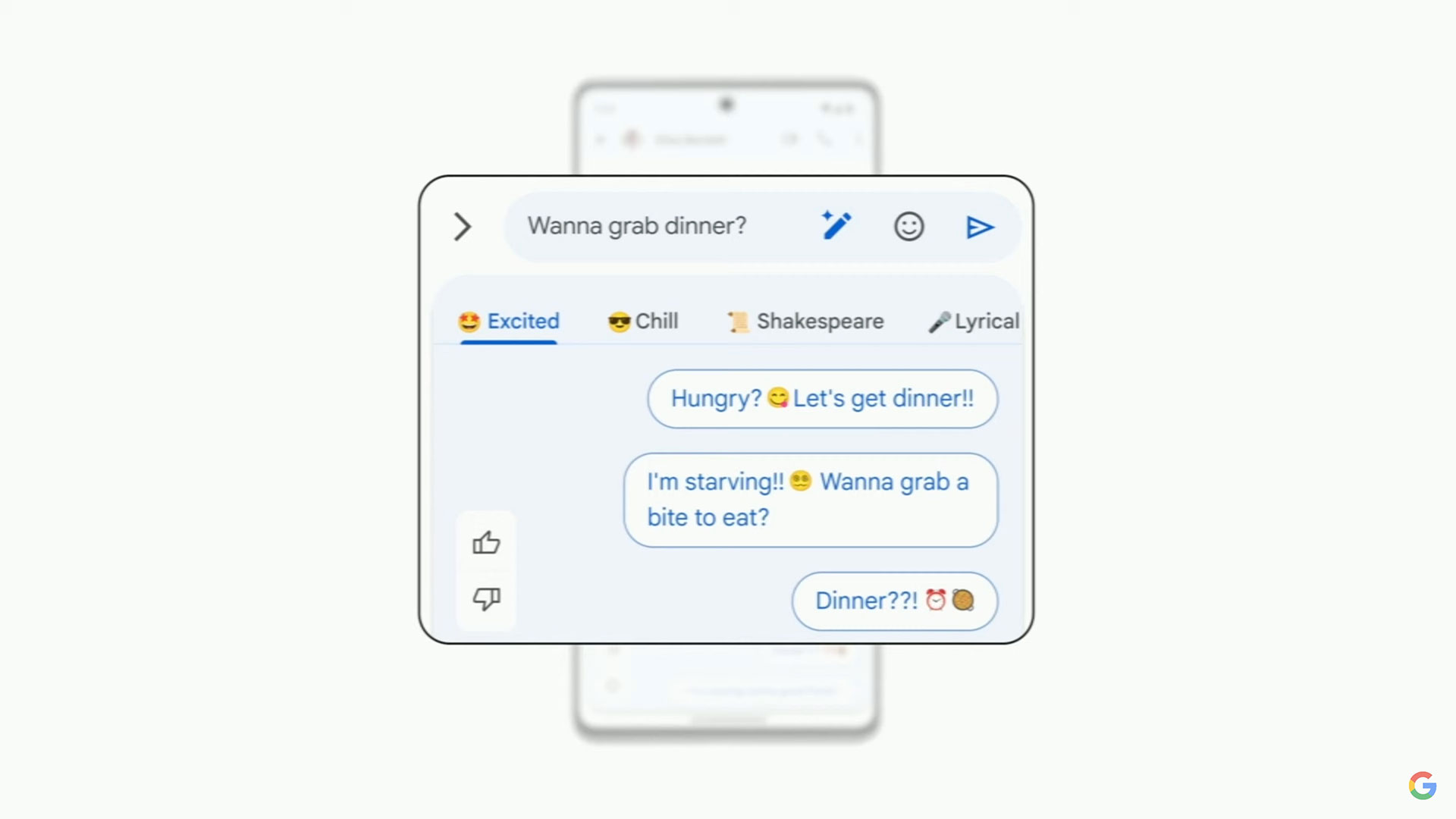
Image Credits: Google
Another of the more fun additions involved the AI advances coming to Google Photos: the soon-to-launch “Magic Editor” feature. This demo caught people’s attention during the event as it showed off a practical, everyday use case for AI.
With Magic Editor, users will be able to make edits to specific parts of the photos — like the foreground or background — as well as fill in gaps in the photo or even reposition the subject for a better-framed shot. For instance, you could fill in the sky to turn a gray, overcast day into a bright blue sky with fluffy clouds, or you could “cut out” the subject of the photo and move them around to a better spot. The latter is similar to Apple’s image cutout feature in iOS 16 but actually put to use.

Image Credits: Google
The niftiest gimmick, however, was using AI to fill in gaps in a photo when you move things around. In one example, a photo of a child holding balloons while sitting on a bench was dragged closer to the center of the photo and AI created more of the bench and balloons to fill in the gaps. How well this works in real-world photos remains to be seen, of course.
Still, the ease of creating images via AI will lead to its own issues, which is why Google also introduced new tools for identifying and labeling AI photos in Search and elsewhere.

Image Credits: KIRILL KUDRYAVTSEV/AFP / Getty Images
In terms of the Android app ecosystem, the company announced several ways for developers to use AI to build and optimize their apps for Google Play alongside other new tools. Notably, developers will now be able to use a Generative AI helper to draft new Play Store listings using Google’s PaLM 2 model. This will initially be available in English and as an experimental tool. Developers could use the tool to generate listings or customize listings for different types of users, among other things.
AI will also be used to summarize users’ app reviews for the Play Store. A new machine translation tool will use AI to translate apps and listings into other languages.
These arrived alongside other Play Store updates aimed at helping developers grow their businesses, like tools to lure back lapsed users, expanded subscription features, and broader access to promotional content, including more ways to market in-app events. Plus developers will be able to now prompt users on certain app versions to update their apps, Google said.
And more…
- Google’s multi-platform application framework, Flutter, announced a milestone of over 1 million published apps and expanded its support for web apps and WebAssembly.
- On Chromebook, Google enabled app streaming through Phone Hub in ChromeOS Beta. The feature lets people use apps from their Android phone in a dedicated window on a Chromebook. The feature works only with select Pixel and Xiaomi devices.
- There are two new options for deploying ML features on Android, Google explains in this I/O dev talk — ML Kit and Android’s custom ML stack.
- Jetpack Compose got a slew of updates.
- Android Studio got an AI-powered coding assistant, Studio Bot. Built on top of Codey, Google’s new PaLM 2-based foundation model specifically trained for coding, the feature is coming to the U.S. first.
Google I/O: Other App Updates
Also at I/O, the company announced a good handful of updates to existing apps, like Home and Maps, some of which involved the use of AI. It also took the waitlist off its AI chatbot Bard, announced plans for AI image generation (via an Adobe partnership) and integrations with third-party apps like Instacart and OpenTable. And it launched a new AI music-making feature in its AI Test Kitchen.
Google Maps
In Maps, Google unveiled Immersive View for Routes — a new feature that builds on the existing AI-powered Immersive View addition announced last year, which fuses Street View and aerial images together to create a digital model of the world. With Immersive View for Routes, you can preview a route ahead of taking it, as opposed to having to click through Street View. Google says you’ll be able to see bike lanes, sidewalks and parking along your journey, and get weather and traffic estimates based on historical data. The feature will start to roll out in the months ahead in 15 cities (Amsterdam, Berlin, Dublin, Florence, Las Vegas, London, Los Angeles, Miami, New York, Paris, San Francisco, San Jose, Seattle, Tokyo and Venice).

Image Credits: Google
Home
Google’s app for controlling your smart home devices, Google Home, was also updated this week with a redesigned interface that includes a new Favorites tab, easier ways to view cameras — including original Nest cameras, support for more Matter-enabled devices, expansion of Matter support to iOS and the ability to do more with Home from Wear OS — like see camera previews in notifications and make adjustments. A new home panel on Android devices is also available, offering quicker access to Google Home directly from the lock screen or quick settings.
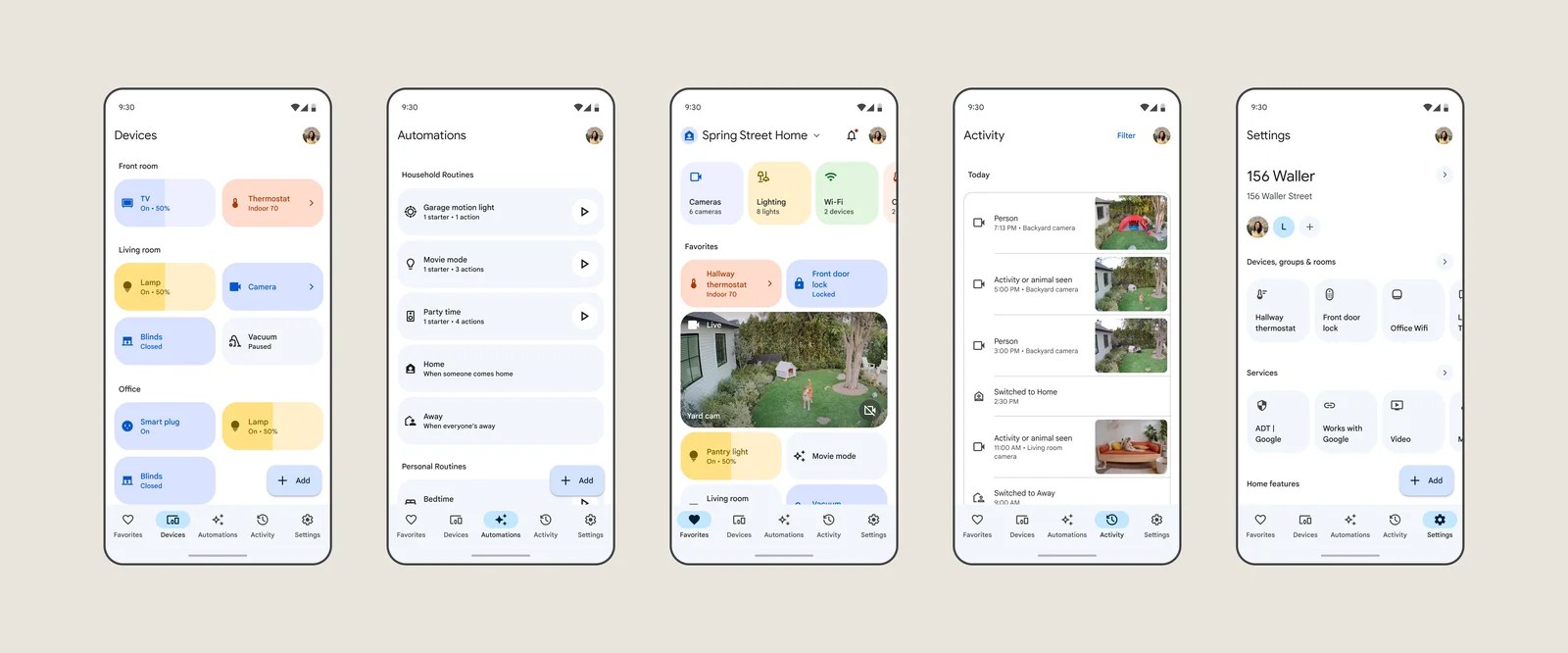
Image Credits: Google/Google Home app
MusicLM
Plus, the company launched an experimental tool “MusicLM” for turning text prompts into music via its AI Test Kitchen app for web, Android and iOS. Users can ask for instruments like “electronic” or “classical,” as well as the “vibe, mood, or emotion” as they refine their creations.
Find My Device
Google introduced a series of improvements coming to its own Find My Device network as well as proactive alerts about unknown trackers traveling with you with support for Apple’s AirTag and others. The news follows Apple and Google’s recently announced plan to lead an industry-wide initiative to draft a specification that would alert users in the case of unwanted tracking from Bluetooth devices.
Find My Device will now make it easier to locate devices by ringing them or viewing their location on a map, even if offline.
WWDC worries
The flurry of AI updates from Google comes at a worrying time for Apple, whose own AI assistant’s progress is reportedly in disarray along with Apple’s other AI efforts. A recent report by The Information detailed organizational dysfunction around Siri as the voice assistant has failed to improve over time. It’s so bad that Apple’s Siri is supposedly mocked internally at Apple, the report said. The company also lost in-house AI expertise to Google, where there was more ground-breaking AI work on things like LLMs.
With WWDC only weeks away, we’ve only heard about the usual slate of coming updates to Apple’s platforms, while the big news is meant to be the long-rumored AR/VR headset for gaming. It’s unclear if there’s even significant consumer demand for such a device, given the declining VR headset sales in 2022.
Apple’s iOS 17 is said to be a quieter update focused on smaller quality-of-life improvements, not a breakthrough AI upgrade where Apple has figured out how to make Siri a better AI helper or has integrated AI improvements across its apps and OS, for instance.
None of Apple’s heel-dragging has hurt the company before, but if AI is the movement the industry claims it will be, this could be a weak spot for competitors to capitalize upon.
Twitter Gets a New CEO

Image Credits: Collage by TechCrunch / Getty Images
Now that Elon Musk has run Twitter’s advertising business into the ground, the Twitter owner is bringing in new leadership — and not a moment too soon. Following rumors of the hire, Musk confirmed via tweet on Friday he has chosen NBCU chairman of its advertising and partnerships group, Linda Yaccarino, as Twitter’s new CEO, replacing himself. Musk will stay on to focus on product design and new technology, he said.
While Musk said Yaccarino will help transform Twitter into the “everything app,” the reality is that this hire is meant to telegraph to advertisers that an adult is once again back in the room as the company tries to recoup its lost advertising revenue and woo back its client base.
That’s a tall order for the new CEO, who will have to contend with Musk’s continual attempts to wreak havoc at Twitter by changing company policies and features with little or no warning, then sometimes reverting them, given enough backlash. That was the case, for instance, with some of the API changes and the labeling of respected U.S. news organizations as if they were on par with the state media and propaganda efforts in communist China. Twitter’s massive layoffs also mean there are fewer engineers to fix problems when Twitter breaks, leading to outages and security incidents, like private tweets becoming public.
Under Musk’s leadership, Twitter lost its top 500 advertisers, including major brands like Mondelez International, Coca-Cola, Merck, Hilton and AT&T. Ad revenue in its mobile app dropped 89% from September-October 2022 to January-February 2023, Sensor Tower data indicated. Despite Musk’s more recent claims of an advertiser return and Twitter reaching a break-even point, several former top advertisers were not found in a list of Twitter’s top 10 or top 50 ad customers as of April.
Meanwhile, the Telsa exec’s plans to monetize Twitter’s verified service via a Blue subscription has not gone well, generating around $11 million on mobile in its first three months — not enough to replace Twitter’s lost ad revenue which is forecast to be down by $2 billion this year.
Installing an ad chief as CEO may not solve Twitter’s problems, however, as Musk himself contributes to advertiser fears that the platform is no longer “brand-safe” by his tweeting and boosting of conspiracy theories and disparaging the media while suspending journalists. Hate speech also has risen under his purview.
Weekly News
Apple
- Apple also rolled out RC builds of macOS Ventura 13.4, iOS 16.5, and iPadOS 16.5.
- Due next week, iOS 16.5 will bring small changes and tweaks like a Sports tab, schedules and scores in Apple News, Pride wallpaper and bug fixes for Spotlight, Podcasts in CarPlay, Screen Time and more. There’s also a reference to new Beats Studio Pro headphones.
- Amid Google’s flurry of I/O updates, Apple released new stats about small businesses on its App Store, noting App Store revenue of small developers grew by 71% in the last two years.
- Apple has now notified WWDC 2023 Swift Student Challenge winners if they have won their prize pack, which includes a WWDC ticket.
Streaming & Entertainment
- Disney+ and Hulu are going to be combined into a single app by year-end, Disney announced during earnings. The news came after Disney+ lost 4 million subscribers in Q2 2023 while Hulu gained 200,000 subs.
- TikTok added a search feature called “NewMusic” that lets users find new tracks and a way for artists to reach their fans. Twitch introduced a new tool that lets streamers create and share short vertical video clips which can be published directly to YouTube Shorts. TikTok and Reels aren’t yet supported, but you could share to those platforms manually.
- Shazam was updated with support for Apple’s new streaming music service, Apple Music Classical.
- Recently fired Tucker Carlson says he’s going to do a show on Twitter. Musk clarified Twitter has no deal with the former Fox News commentator.
- Spotify removed around 7% of songs uploaded to its platform by AI music startup Boomy. The tens of thousands of tracks removed had been flagged by Universal Music as engaging in artificial streaming behavior — that is, bots pretending to be humans to inflate the streaming numbers.
- The new MAX app which will replace HBO Max for existing customers is live for preorder on the App Store. The new app will include Discovery+ content when it rolls out in the U.S. on May 23. TechCrunch talked to the company about how it reportedly fixed the bugs and improved performance in the upcoming app.
Fintech
- Robinhood announced 24-hour trading for select stocks and ETFs, starting with 43 securities. The feature will arrive for all users next month. It also reported crypto trading revenue was down 30% YoY in Q1 to $38 million.
- Banking and money management app Revolut is losing its CFO Mikko Salovaara shortly after CEO James Radford departed in March, which had not been announced publicly.
- A new banking app Charlie launched its services aimed at the 62+ community. The app promises faster access to their Social Security check, 3% earnings on balances and no monthly fees or minimums. The company is backed by $7.5 million in funding, led by Better Tomorrow Ventures.
- PayPal reported Q1 TPV up 10% YoY to $354.5 billion, above estimates, and net revenue up 9% to $7.04 billion. But shares dropped as the company lowered its forecast for full-year margins.
Social
- Twitter released the first version of encrypted DMs but the feature is limited to Blue subscribers and accounts from Verified Organizations. It doesn’t protect against man-in-the-middle attacks or support group chats at this time. Sure, we trust the company that couldn’t even keep Twitter Circle tweets private.
- Twitter is purging old accounts from its platform, which will free up desired usernames, said Elon Musk.
- Pinterest is combining its creation tools for Pins and its video-focused Idea Pins and rolling out more editing features as well as measurement and engagement tools to woo creators.
- Mastodon app Ivory, from the makers of Tweetbot (a Twitter client killed by Elon Musk) received an update (version 1.4) that brings a redesigned media viewer, new sounds for boosts, new icons and a Safari extension that let you open Mastodon links directly in Ivory.
- Bluesky is gaining traction as new data shows the app had 628,000 downloads in April 2023 alone, up 606% from March. Mastodon had 90,000 downloads at this time.
- Social news app Artifact now lets you follow your favorite writers, in another challenge to Twitter.
- LinkedIn is phasing out its China app, InCareer, due to competition and broader economic concerns. The company will cut 716 jobs as a result.
- Meta is shutting down its Messenger app for Apple Watch on May 31. The company, like others, decided the Watch doesn’t require a standalone app experience as users can still receive notifications on the Watch without a native app. Users, however, have not been happy about the move and are complaining on Twitter. Messenger is the latest in a long line of apps that have abandoned the Watch, including Uber, Target, Hulu, Evernote, Slack, Trello and more.
- Meta is testing paying Facebook creators based on Reels’ performance, instead of ad earnings, and will roll out payments to Instagram in the months ahead.
- Meta also announced an AI Sandbox with generative AI tools that will allow advertisers to create text variations, background images from text and cropped images for their ads on Facebook and Instagram.
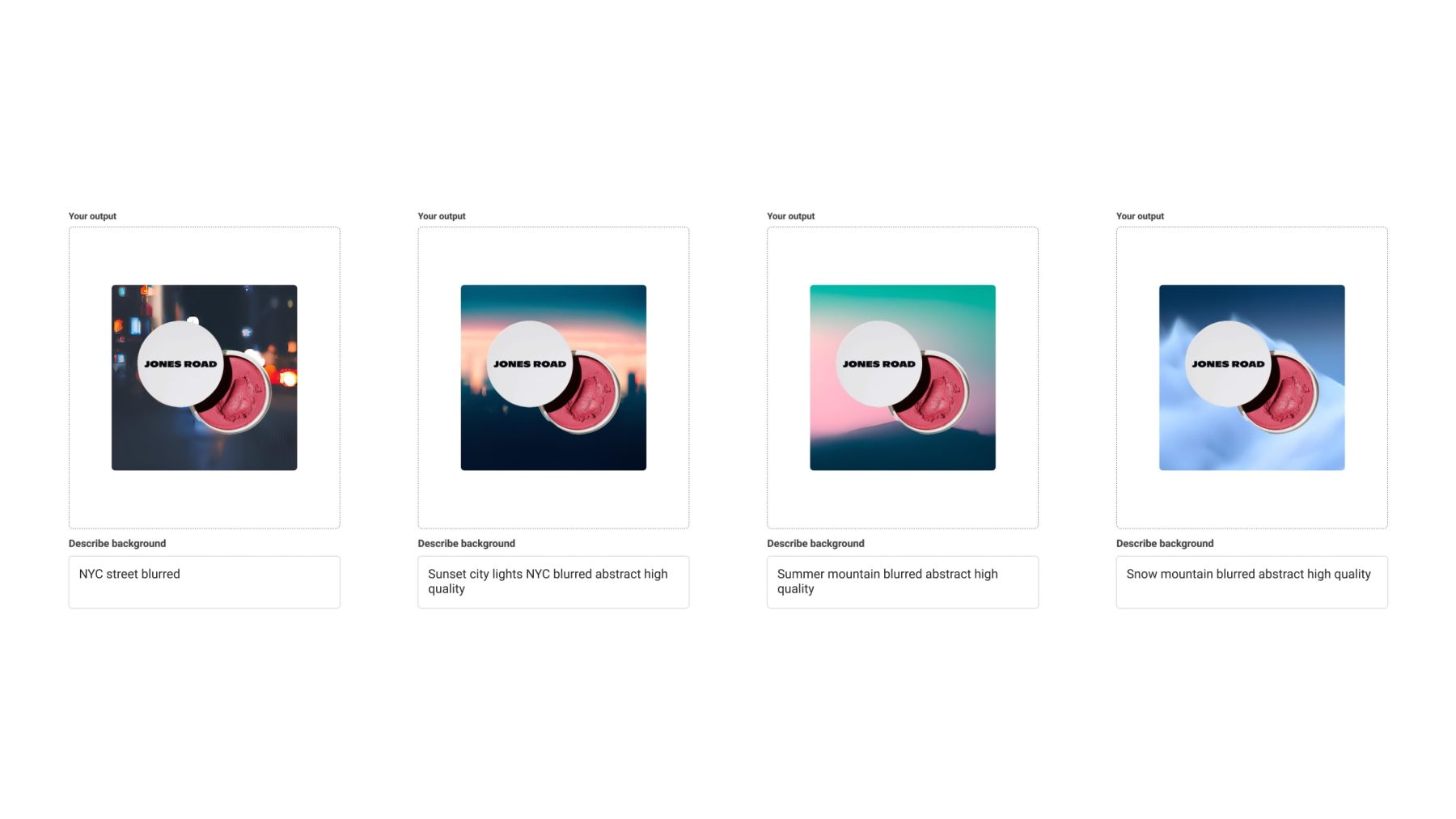
Image Credits: Meta
Messaging
- WhatsApp rolled out back-end fixes to address problems with spam calls that were impacting Indian users, which had caught the attention of the Indian government. The fixes leverage AI and ML systems to lessen the problem.
- Stripe and WhatsApp partnered to allow Singapore-based users to pay some businesses within the app, following the launch of biz payments in India and Brazil.
Dating
- Tinder is removing social handles from users’ bios. The company said the change comes about because people were using their profiles on the app to promote their businesses, sell things, fundraise and campaign, which is not what Tinder is meant for.
- A new dating app called Teaser AI (preorder), built by the same team behind Dispo, promises to pair users with AI chatbots who can handle the initial “getting to know you” chats that become tedious.
Travel and Transportation
- Uber added flight bookings to its U.K. app in partnership with Hopper as it moves toward becoming a super app.
- Airbnb reported Q1 revenue up 20% YoY to $1.8 billion, above estimates, making for its first profitable Q1 with $117 million in net income. But a cautious outlook for Q2 sent the stock down by 10%+ after earnings.
Gaming
- Roblox’s Q1 revenue is up 22% YoY to $655.3 million, and bookings were up 23% to $773.8 million.
- Niantic’s new Peridot game is the first to use a new immersive shopping experience from Amazon called “Amazon Anywhere,” which brings Amazon’s marketplace to apps and games. For instance, in Peridot, players can now link their Amazon account to purchase Peridot merch, like t-shirts.
Etc.
- Eventbrite integrated GPT capabilities into the platform to aid in event planning. The tools will arrive later this month to help with time-consuming steps in event planning, like creating event pages, email campaigns and social media ads.
- ByteDance subsidiary Lemon Inc. filed a trademark for 8th NOTE PRESS, hinting toward book publishing plans. The company recently launched an Instagram and Pinterest competitor Lemon8 in the U.S., which it paid influencers to promote on TikTok.
- Apple is bringing Final Cut Pro and Logic Pro to the iPad later this month. The apps will hit the App Store for $4.99/mo or $49/year.
Government & Policy
- Florida joins other states in banning TikTok on government devices. The app was already banned on university-owned devices.
- Apple’s App Tracking Transparency (ATT) feature, which requires apps to get consent from users before tracking them for ad targeting purposes, is now facing a competition probe in Italy. The competition watchdog is concerned that Apple is creating an unfair advantage for its own personalized ads that aren’t subject to the same permission pop-ups.
Downloads
HiNOTE

Image Credits: HiNOTE
A new app called HiNOTE lets users create personalized messages for things like greetings, invites, thank-you’s and more, which are shared as images with your own text. Often, people send a text followed by a photo or GIF to add a more personal feel to their communications, but HiNOTE lets you create imagery with whatever it is you want to say. The app has sent over 1 million notes since its 2022 launch. Read the full review on TechCrunch.
This Week in Apps: Google I/O 2023 recap; Android, apps and AI; Twitter’s new CEO by Sarah Perez originally published on TechCrunch
All hail the Unicorn Kingdom?
W
elcome to the TechCrunch Exchange, a weekly startups-and-markets newsletter. It’s inspired by the daily TechCrunch+ column where it gets its name. Want it in your inbox every Saturday? Sign up here.
This week, I look into three topics that don’t have to be an “either/or” situation: France or the U.K.; product-led or sales-led; psychedelics medicine or traditional health care. — Anna
Cool or cringe?
“Welcome to the Unicorn Kingdom” is the slogan of a new U.S. campaign aimed at promoting the U.K. as “a place with all the right ingredients for tech success.”
When British prime minister Rishi Sunak referred to the new tagline at an event recently, some called it cringe. However, others beg to disagree.
To get biased national pride out of the equation, I reached out to Hoxton Ventures partner Hussein Kanji for two reasons: He’s London-based and a self-described “proud American.”
All hail the Unicorn Kingdom? by Anna Heim originally published on TechCrunch
https://techcrunch.com/2023/05/13/united-kingdom-unicorn-kingdom/
Deal Dive: AI relationship coach Amorai offers more questions than answers
Building and maintaining relationships is hard, and COVID-19 definitely didn’t help. Multiple studies have shown that adults have gotten even more lonely since the start of the pandemic.
Founders are trying to find tech solutions. There are many startups looking to combat loneliness — some formed years before the pandemic — including senior-focused ElliQ and Replika, which creates an AI companion, and Infection AI’s Pi, an emotional support bot. But a newer entrant really caught my eye this weekAmorai.
The startup has built an AI relationship coach to help people grow and foster real-life connections by offering advice and answers to relationship questions. The company was founded by former Tinder CEO Renate Nyborg and was incubated in Andrew Ng’s AI Fund. The company just raised an undisclosed amount of pre-seed funding that took only 24 hours to raise, Nyborg told Vox’s Recode Media podcast back in April.
While combating loneliness is a great mission — and some groups of people may be more open to chat with a bot than a human — this feels like it has the potential to go so wrong so fast. But what do I know? So I pinged an expert.
Turns out I’m not the only one a little wary of this concept. Maarten Sap, a professor at Carnegie Mellon University and researcher for the nonprofit Allen Institute of AI, shared my concern. Sap’s research focuses on building social commonsense and social intelligence into AI. He’s also done research in the development of deep language learning models that help understand human cognition. Essentially, he knows a thing or two about how AI interacts with humans.
Sap told me that while the idea of creating a tech solution to help foster real-life relationships is admirable — and there is definitely proof that there will be solid use cases for AI in combating these types of issues — this one gives him pause.
“I’m saying this with an open mind, I don’t think it will work,” he said. “Have they done the studies that show how this will work? Does [Amorai] increase [users’] social skills? Because yeah, I don’t know to what extent these things transfer over.”
The biggest thing that gives him pause, he said, is the worry that this type of application will either give all of its users the same advice, good or bad, and that it would be hard for AI to get the nuances right about certain relationships. Also, would people trust advice from AI over another person anyway?
“The idea of the pickup artists sort of came to mind,” Sap said. “Is this going to give you advice to tell a bunch of straight men to nag women or try to sleep with them? Or are their guardrails for this?”
If the model is designed to learn off of itself, it could create an echo chamber based on the types of questions people are asking. That, in turn, could point the model to a problematic direction if left unchecked. Bing users might have already learned this the hard way when its AI told people they were unhappy in their marriages.
Sap said that one way this could definitely work would be if there were a human touch to this. Human oversight to ensure that the app is giving the right advice to the right people could make this a powerful tool. But we don’t know if that is the case because the company isn’t answering questions or accepting interviews.
This round also highlights how deep the FOMO in AI really is. Someone who researches this stuff every day can’t see how this company could really work, and yet Amorai raised funding in 24 hours pre-launch in a bad market.
Of course, investors know more about the company than what is released, and sure, these concerns can serve as feedback for the startup. But like a lot of AI startups, I have to assume it’s building with good intentions, despite having nothing concrete to prove it.
I also don’t believe this was a small pre-seed round — something I usually assume when a company doesn’t disclose the total of funding; if it was big, you’d want people to know — but in this case, I think it’s likely the opposite. It’s a lot of pressure to raise a lot of money before executing or finding product-market fit.
“When I hear about these kinds of ideas and startups, it comes from a good place, but it often is just the tech solutionist mindset,” Sap said.
Deal Dive: AI relationship coach Amorai offers more questions than answers by Rebecca Szkutak originally published on TechCrunch
https://techcrunch.com/2023/05/13/ai-relationship-building-amorai/
Amazon Overhauls Delivery Network to Dispatch Packages Faster, More Cheaply
The company’s changes have cut delivery times, transformed inventory management and altered the search results customers see on its flagship e-commerce website.
TikTok Feeds Teens a Diet of Darkness
Self-harm, sad-posting and disordered-eating videos abound on the popular app.
https://www.wsj.com/articles/tiktok-feeds-teens-a-diet-of-darkness-8f350507?mod=rss_Technology
Austin Russell became the youngest self-made billionaire in 2021; now he owns Forbes
Austin Russell is on quite a run.
The 28-year-old founder and CEO of Luminar, which develops vision-based lidar and machine perception technologies primarily for self-driving cars, told the Wall Street Journal earlier today that he is buying an 82% stake in Forbes Global Media Holdings in a deal that values the company at nearly $800 million.
According to the WSJ, Russell’s stake includes the remaining portion of the company owned by its namesake family, which sold 95% of the company to the Hong Kong-based investor group Integrated Whale Media back in 2014. Forbes was essentially on sale from the moment it called off its merger with a special-purpose acquisition company in June of last year, after the market soured and investors lost their appetite for SPACs.
Luminar itself had better timing; it went public via a SPAC merger in 2021 when retail investors were still clamoring for shares in mobility tech companies. Still, by the time Forbes was calling off its own SPAC plans, nearly every mobility SPAC was trading below its offering price, and Luminar has not been immune to the broader downturn. Valued at $3.4 billion when it hit Wall Street, its market cap is now roughly $2 billion. Just three days ago reported slightly wider than expected losses.
Some retail investors might not be so happy about its performance, even while Russell told the Silicon Valley Business Journal last year that he had no regrets about the SPAC. (From his perspective, the alternative would have been to potentially run out of money, as private market investors began to snap shut their checkbooks.)
In the meantime, longer-term shareholders in Luminar might find it concerning that Russell — described by Forbes itself in 2021 as the world’s youngest self-made billionaire — will soon be directing some of his attention elsewhere.
Shareholders — and Luminar employees — may also find the acquisition confusing.
While it has become fashionable to run more than one company at once (Elon Musk, Jack Dorsey), as well as to be a billionaire owner of a media company (Jeff Bezos, Laurene Powell Jobs, Marc Benioff), buying Forbes when so many outlets are fighting for survival bucks conventional wisdom.
Then again, Russell has been focused on Luminar since 2012, when he dropped out of Stanford to start the company, aided by a $100,000 grant from renowned investor Peter Thiel. (The Thiel Fellowship program, founded in 2011, continues to give $100,000 to select students who are eager to spend two years on their idea instead of “sitting in a classroom.”)
Russell has enjoyed the fruits of his work in the ensuing years. He purchased an $83 million Los Angeles spread in 2021 that has since been featured in the hit show “Succession.” He also reportedly paid another $10.6 million for a 13,000-square-foot mansion in Winter Park, Florida, near Luminar’s Orlando headquarters. But after spending his entire career focused on Luminar, he could well be looking to alter how he invests his time.
As Y Combinator Paul Graham once said as he expressed his distaste for funding founders who are especially young, sometimes the worse thing that can happen to a person is that his or her startup succeeds straightaway.
“[I]f you start a successful startup, like, the footloose and fancy-free days of your life are over. You’re working for that company.”
In a statement to the WSJ, Russell said simply of his motivations that: “Forbes is something I had always looked up to as a brand and as a media empire.” He also told the outlet that he doesn’t plan to get involved in Forbes’s day-to-day operations but that he wants to both grow the outfit and emphasize “philanthropy” within the business.
TechCrunch reached out to Russell a bit ago; we hope to have more on his latest move soon.
Austin Russell became the youngest self-made billionaire in 2021; now he owns Forbes by Connie Loizos originally published on TechCrunch
Help! My Political Beliefs Were Altered by a Chatbot!
AI assistants may be able to change our views without our realizing it. Says one expert: “What’s interesting here is the subtlety.”
https://www.wsj.com/articles/chatgpt-bard-bing-ai-political-beliefs-151a0fe4?mod=rss_Technology

